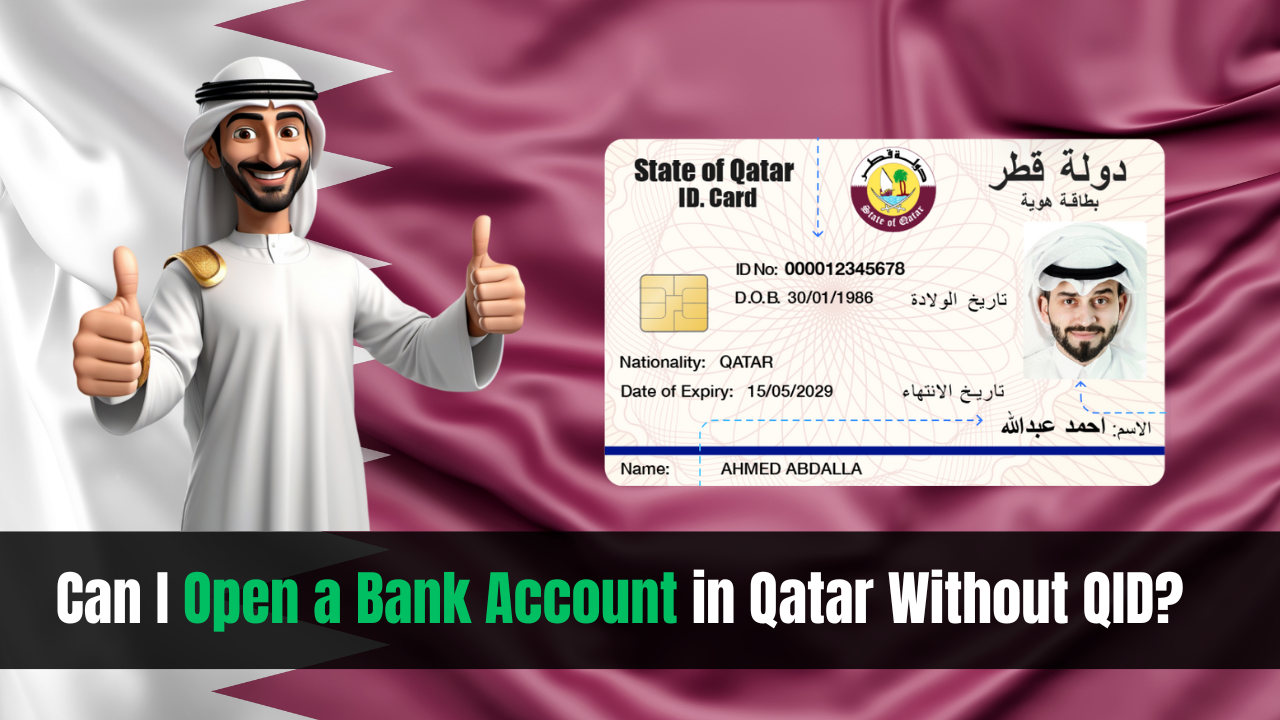Can I Open a Bank Account in Qatar Without QID? For newcomers to Qatar, navigating the banking system can initially feel daunting, especially without a Qatari ID (QID). However, it is indeed possible to open a bank account in Qatar without a QID, provided you follow specific guidelines and meet the requirements set forth by local banks and the Qatar Central Bank.
Why QID Matters for Banking in Qatar
In Qatar, the Qatari ID (QID) is a critical form of identification used for various legal and administrative purposes, including banking. For expatriates, a QID is issued after successfully obtaining a residency permit.
However, there is a window of time after arriving when expatriates may not yet have their QID. Recognizing this, some banks in Qatar allow newcomers to open a bank account on a temporary basis, provided they submit their QID within a specific period.
Can I Open a Bank Account in Qatar Without QID?
For those eager to open a bank account before receiving their QID, certain banks in Qatar offer provisional solutions. According to Qatar Central Bank policy, you are allowed to open a bank account by presenting alternative documents initially.
However, within 90 days of account opening, you are required to submit your QID to keep the account active. Failing to do so will result in the account being temporarily blocked until the QID is provided.
Types of Accounts Available to Open Without QID
While banking options may be limited without a QID, some banks offer access to basic account types. Typically, a Current Account or Savings Account can be opened on a provisional basis. However, each bank’s policy may differ, so it’s essential to contact the bank to confirm available options.
Documents Required to Open a Bank Account Without QID
To open a bank account in Qatar without a QID, you’ll need to provide alternative identification and supporting documents. Banks in Qatar generally accept the following documents as part of the initial verification process:
- Passport: A valid passport is essential for identity verification.
- Entry Visa or Work Permit: Proof of entry into Qatar or a temporary work permit may be required.
- Employment Letter: A letter from your employer indicating your employment status can help in meeting account opening criteria.
- Proof of Address: This could be a rental agreement or utility bill, if applicable.
How to Open a Bank Account in Qatar Without a QID
Here’s a simplified step-by-step guide for opening a bank account in Qatar without a QID:
- Choose Your Bank: Research banks in Qatar and compare their policies for account opening without a QID.
- Prepare Documentation: Collect all necessary documents, such as your passport, visa, and employment letter.
- Visit the Bank: Go to your chosen bank’s branch and discuss account options with a customer service representative.
- Complete Application Form: Fill out the account opening form provided by the bank.
- Submit Documentation: Present your documentation for verification, and clarify the timeframe for submitting your QID.
- Obtain Temporary Access: Once your application is approved, you’ll receive temporary access to the account, with the condition to submit your QID within 90 days.
Top Banks in Qatar Offering Accounts Without QID
Several banks in Qatar cater to expatriates and offer account-opening options without an immediate QID requirement. Here’s a list of some popular banks in Qatar and their general approach to this policy:
| Bank Name | Account Type | QID Submission Period |
|---|---|---|
| Qatar National Bank (QNB) | Current Account, Savings | Within 90 days |
| Doha Bank | Current Account | Within 90 days |
| Commercial Bank of Qatar | Current Account | Within 90 days |
| Al Khaliji Bank | Savings Account | Within 90 days |
Maintaining Compliance with Qatar Central Bank Policy
As per Qatar Central Bank regulations, expatriates are required to submit their QID within the 90-day timeframe. This rule is in place to ensure that all account holders are in compliance with the residency and identification requirements. Once you receive your QID, present it to your bank immediately to avoid any account restrictions.
Failure to comply will result in your account being blocked temporarily until the bank receives your QID. During this blocked period, transactions will be restricted, but you can reactivate the account by simply providing your QID at any branch.
Alternative Banking Options for Those Without a QID
For newcomers who might face a delay in receiving their QID, alternative banking solutions are available. Some expatriates may prefer to use international bank accounts or digital wallets until they can open a local account. International banks with branches in Qatar, such as HSBC, can provide cross-border account services. Additionally, online payment systems and mobile wallets can help facilitate essential financial transactions during the initial months of your stay.
| Alternative Solution | Description |
|---|---|
| International Bank Account | Access to funds via international banks operating in Qatar |
| Digital Wallets | Mobile-friendly transaction solutions |
Benefits of Opening a Local Bank Account in Qatar
Although opening a bank account without a QID is a temporary solution, transitioning to a local account with your QID offers several advantages, including:
- Seamless Salary Transfers: Employers in Qatar typically transfer salaries to local bank accounts.
- Access to Local Financial Services: Local bank accounts provide access to a wide range of services, such as loans, credit cards, and investment options.
- Ease of Transactions: Managing funds and conducting day-to-day transactions becomes easier with a local account.
Conclusion
Opening a bank account in Qatar without a Qatari ID is possible and allows newcomers the flexibility to access banking services before receiving their residency ID. By adhering to Qatar Central Bank guidelines and providing the necessary documentation, expatriates can benefit from financial services while waiting for their QID. Remember to submit your QID within 90 days to avoid account restrictions, and reach out to your bank for any further guidance.
